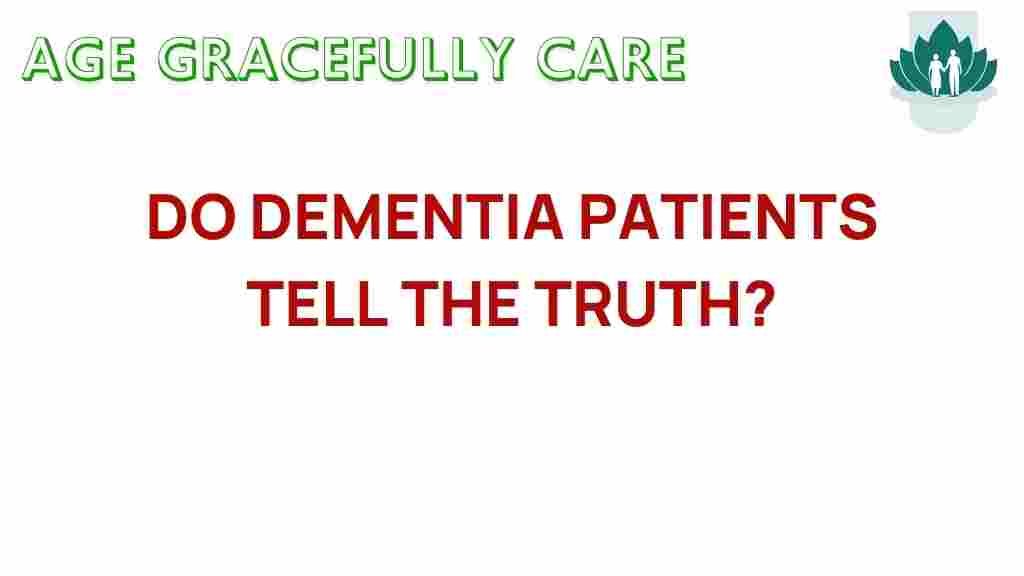Do Dementia Patients Speak the Truth? Understanding Memory Loss and Communication
Dementia is a complex condition that affects millions of individuals worldwide. As cognitive decline progresses, communication becomes increasingly challenging for both patients and caregivers. One common question that arises in the context of dementia is whether these patients can still communicate the truth. This article aims to unravel the mystery surrounding dementia, truth, memory loss, and communication. By enhancing our understanding of these elements, caregivers and healthcare professionals can foster better interactions with dementia patients.
The Nature of Dementia and Memory Loss
Dementia encompasses a range of symptoms associated with a decline in memory, thinking, and social abilities. It is essential to understand how dementia affects communication and the perception of truth:
- Cognitive Decline: Dementia leads to cognitive decline, which can hinder a person’s ability to recall events accurately.
- Memory Loss: Patients may experience significant memory loss, making it difficult for them to remember recent conversations or events.
- Altered Reality: Individuals with dementia may create alternate realities based on their memories, which can sometimes contradict factual truth.
Understanding Communication Challenges
Communication is vital for expressing needs and emotions. However, dementia patients often face numerous challenges:
- Language Difficulties: Patients may struggle to find the right words or follow conversations.
- Non-Verbal Cues: Many individuals with dementia rely on non-verbal communication, such as gestures and facial expressions.
- Emotional Responses: Due to cognitive decline, their emotional responses may not align with the context, leading to confusion.
Do Dementia Patients Speak the Truth?
The question of whether dementia patients can speak the truth is complex and nuanced. Here are some key points to consider:
- Subjective Truth: Patients may express feelings or thoughts based on their current beliefs, which can differ from objective reality.
- Confabulation: Some dementia patients may unintentionally fabricate stories to fill in memory gaps. This is not a deliberate lie but rather a coping mechanism.
- Emotional Truth: Even if the facts are incorrect, the emotions behind a patient’s words can represent their true feelings and needs.
Caregiver Perspectives and Patient Honesty
For caregivers, understanding the dynamics of patient honesty is crucial. Here are some insights:
- Empathy is Key: Caregivers should approach conversations with empathy, recognizing that the patient’s reality may differ from theirs.
- Building Trust: Establishing a trusting relationship can encourage more open communication, allowing caregivers to better understand the patient’s perspective.
- Active Listening: Listening carefully to what the patient says can provide valuable insights into their feelings and thoughts, even if the details are unclear.
How to Communicate Effectively with Dementia Patients
Effective communication with dementia patients requires patience and specific strategies. Here’s a step-by-step process to enhance interactions:
Step 1: Create a Comfortable Environment
Ensure that the environment is calm and free from distractions. A quiet space allows for more focused conversations.
Step 2: Use Simple Language
Employ clear and straightforward language. Avoid jargon and complex sentences to aid understanding.
Step 3: Encourage Non-Verbal Communication
Utilize gestures, facial expressions, and visual aids to support verbal communication. Non-verbal cues can significantly enhance understanding.
Step 4: Be Patient and Allow Time
Give the patient ample time to respond. Rushing can lead to frustration and hinder effective communication.
Step 5: Validate Their Feelings
Regardless of the accuracy of their statements, validate the patient’s feelings. This fosters trust and openness.
Troubleshooting Communication Issues
Even with the best strategies, communication challenges may still arise. Here are some troubleshooting tips:
- Redirect Conversations: If a patient becomes agitated or upset, gently redirect the conversation to a different topic.
- Reassure and Comfort: Use comforting words and physical touch to help ease anxiety and encourage openness.
- Adapt to Their Needs: Be flexible in your approach. If one method isn’t working, try a different strategy.
The Role of Healthcare Professionals
Healthcare professionals play a crucial role in supporting effective communication with dementia patients:
- Training and Education: Continuous training on dementia care can equip healthcare workers with the necessary skills to communicate effectively.
- Interdisciplinary Approaches: Collaboration among healthcare providers, caregivers, and families can improve patient outcomes.
- Emphasizing Patient-Centered Care: Focusing on the individual needs of dementia patients can enhance their quality of life and communication.
Understanding the Emotional Impact of Dementia
The emotional toll of dementia extends beyond the patient to their caregivers and loved ones. Here’s how to navigate these challenges:
- Support Groups: Joining support groups can help caregivers share experiences and coping mechanisms.
- Self-Care: Caregivers must prioritize their mental and physical health to provide the best support for their loved ones.
- Professional Help: Seeking professional counseling can be beneficial for both caregivers and patients in managing emotional challenges.
Conclusion: Embracing Understanding in Dementia Care
In conclusion, while dementia patients may not always communicate the truth in a conventional sense, understanding their reality is crucial. As caregivers and healthcare providers, embracing a compassionate and patient approach can lead to more meaningful interactions. By focusing on emotional truth and fostering open communication, we can support dementia patients and improve their quality of life.
For more information on dementia care techniques, consider exploring this resource.
If you’re looking for community support, check out local support groups dedicated to caregivers and families affected by dementia.
This article is in the category Health and created by AgeGracefullyCare Team
